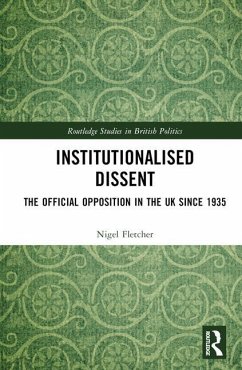This book provides a comprehensive analysis of a peculiar but now firmly established British institution- the Official Opposition- tracking its development since 1935.
Despite its inherent importance to the conduct of politics and government, the Official Opposition as an institution remains poorly understood. The concept of 'Loyal Opposition' has become so entrenched in the Westminster parliamentary model that it is now taken for granted that the principal challengers to the government of the day are given significant official recognition by the state. Political dissent has become institutionalised and legitimised.
Using previously unpublished archive material and candid interviews with former Leaders of the Opposition and their staff, the book examines the constraints and dilemmas facing the Official Opposition. Detailing the way successive opposition leaders have organised their staff and Shadow Cabinets, it highlights the practical difficulties they face in holding the government to account and preparing for government. The study concludes by arguing that the role of the Official Opposition is vital but ill- defined, that the inadequacy of its resources has impacted on its effectiveness, and that there are potentially serious challenges to it as a model.
The book will be of key interest to scholars of British politics, British history, parliamentary and legislative studies, and government and democracy more generally.
Despite its inherent importance to the conduct of politics and government, the Official Opposition as an institution remains poorly understood. The concept of 'Loyal Opposition' has become so entrenched in the Westminster parliamentary model that it is now taken for granted that the principal challengers to the government of the day are given significant official recognition by the state. Political dissent has become institutionalised and legitimised.
Using previously unpublished archive material and candid interviews with former Leaders of the Opposition and their staff, the book examines the constraints and dilemmas facing the Official Opposition. Detailing the way successive opposition leaders have organised their staff and Shadow Cabinets, it highlights the practical difficulties they face in holding the government to account and preparing for government. The study concludes by arguing that the role of the Official Opposition is vital but ill- defined, that the inadequacy of its resources has impacted on its effectiveness, and that there are potentially serious challenges to it as a model.
The book will be of key interest to scholars of British politics, British history, parliamentary and legislative studies, and government and democracy more generally.
"The official opposition is integral to the contemporary political system of the United Kingdom. The lack of a full historical study of this subject is therefore a substantial gap in our knowledge. We are fortunate that Dr. Fletcher has now made good on this omission; and done so with considerable skill. I recommend this work highly. It should remain an essential text for some time to come."
Andrew Blick, Professor of Politics and Contemporary History and Head of Department of Political Economy, King's College London
Andrew Blick, Professor of Politics and Contemporary History and Head of Department of Political Economy, King's College London

